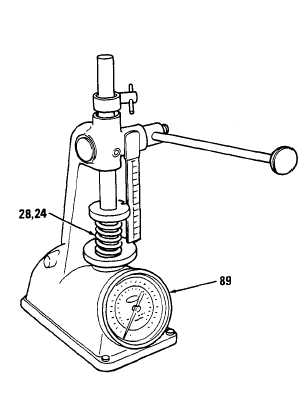TM 9-2815-202-34
NOTE
(b) Replace valves if warped, excessively
worn, or pitted.
Maximum amount exhaust valve should protrude beyond cylinder head” and still
maintain proper piston to valve clearance is shown. Grinding reduces thickness of valve
seat insert and valve recedes into cylinder head. Replace valve seat insert if valve
recedes beyond limits.
(d) After grinding is completed, clean valve seat insert. Measure concentricity of insert in
relation to valve guide. If runout exceeds 0.002 inch, check for bent or worn valve guide
before regrinding insert.
(e) Determine position of contact area between valve and valve seat insert as follows:
1. Apply a light coat of Prussian blue or equivalent to valve seat insert.
2. Lower stem of valve in valve guide and bounce valve on seat, Do not rotate valve.
3. Observe area of contact on valve face. Most desirable area of contact is at center of
valve face.
(7) Exhaust valves and springs
(a) insure valve stems are free from
scratches or scuff marks. Valve faces
must be free of ridges, cracks, or
pitting.
(8)
(c) Using spring tester (89), replace valve
spring (28) when a load of less than 25
pounds will compress it to 1.80 inches.
CAUTION
Replace both springs under an
exhaust valve bridge together. Mating
a new spring with a used spring can
cause unbalanced valve operation.
Cam followers and cam follower springs.
(a) Examine cam follower springs (24) for
wear or damage. Using spring tester
(89), check spring load. Replace spring
when a load of Iess than 172 pounds -
will compress it to a length of 2.125
inches.
Change 1
5-49
|
|




